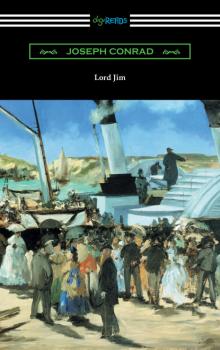Joseph Conrad
Список книг автора Joseph ConradThe Secret Sharer and Other Stories
“The Secret Sharer and Other Stories” is a collection of seafaring tales by famed author Joseph Conrad. In “The Secret Sharer”, a nameless captain discovers a stow-away clinging to the side of his ship and secretly brings him aboard and harbors him in his cabin. In “Typhoon”, the main character, Captain MacWhirr, decides to sail his vessel through a typhoon in the South Pacific. His bold action, at first to the protest of his crew, later earns him their admiration and respect. In “The Nigger of the ‘Narcissus’” we have the tale of James Wait, a dying West Indian black sailor whose condition seems to parallel the fate of the merchant ship ‘Narcissus’, of which he is a member of the crew. “Youth” is the semi-autobiographical story of the first voyage of Charles Marlow, the narrator of Conrad’s most famous novel “Heart of Darkness”. This quest tale finds the youthful Marlow’s nerve, strength, and patience all tested on his journey to becoming a man. A shining example of Conrad’s later literary ability, “The Shadow-Line” is his 1915 novella of a young man in his first command as a sea captain. It is a suspenseful story of a defining moment of a young life, when the indistinct line separating an inexperienced boy from a mature man becomes perfectly clear. These exhilarating nautical tales by a master storyteller portray intense trials of human spirit and the powerful demands of duty and honor. This edition includes a biographical afterword.
The Secret Agent
A classic and thrilling tale of espionage and murder, Joseph Conrad’s “The Secret Agent” was first published in 1907. Set in London in 1886, the novel centers around Mr. Adolf Verloc, a spy who owns a small shop and lives with his wife Winnie, her mother and her mentally disabled brother Stevie, above his business. He is also a member of a largely ineffectual anarchist group, whom he meets with regularly to discuss politics and produce anarchist literature. Unknown to his fellow anarchists, Verloc is secretly working for the Embassy of an unnamed country as an “agent provocateur.” Verloc is told by his government contact that he and his associates are to bomb the Greenwich Observatory in London in order to make the British see anarchism as a greater threat and work more actively to suppress it. In scenes alternating between both before and after the bombing, the novel follows the police investigation of the bombing and the family drama unfolding in Verloc’s own home, as Stevie’s inadvertent involvement in the bombing comes to light. Considered to be one of Conrad’s best works, as well as a prescient study of modern terrorism, it is also a searing and tragic story of family love and loyalty. This edition includes a biographical afterword.
Lord Jim
Originally published in serial form between October 1899 and November 1900, Joseph Conrad’s “Lord Jim” is the story of Jim, a young British Seamen and the first mate of the “Patna”, a ship full of Muslim pilgrims on a hajj to Mecca. When the ship is damaged and begins to take on water, Jim, along with the Captain and some of the crew abandon the ship and its passengers. Jim’s group and the “Patna” are rescued separately and the crew’s reprehensible actions and dereliction of duties are made public. Jim, abandoned by the Captain and the rest of the crew, is left alone to face a magistrate’s court over the matter. Stripped of his command and his reputation ruined, Jim is left directionless, going from one job to another, pursued by his guilt and despair. Jim eventually accepts a job on a small, remote island, hopeful that he may finally find peace far away from those who know what he has done. Jim, filled with penitence, seeks to find redemption in kindness and service to his fellow man. Considered by many to be Conrad’s most romantic novel, Jim’s ultimately tragic struggle toward redemption and forgiveness continues to resonant with readers to this day. This edition includes a biographical afterword.
Nostromo
First published in 1904, “Nostromo” is widely considered one of Joseph Conrad’s best works. Set in the fictitious mining town of Sulaco, a port city in the imaginary South American country of Costaguana, it is the story of Senõr Gould, an English expatriate who owns the silver-mining concession in the country. When the country becomes engulfed in increasing violence and chaos, Senõr Gould charges Nostromo, his trusted head longshoreman, with the duty of hiding his silver so that it does not fall into the hands of his political enemies. Nostromo is highly respected by his fellow citizens and is viewed as being incorruptible, so he is a natural choice for such a serious task. Nostromo succeeds in hiding the silver, but his good deed does not bring him the favor and respect that he feels is his due and his bitterness morphs into greed. Even the perfect and pure Nostromo cannot resist the power of the silver and it is his eventual undoing. Set against the lush landscape and turbulent politics of South America, “Nostromo” is a Conrad’s masterful tale of the power of money, its ability to corrupt, and the destruction it leaves behind. This edition includes a biographical afterword.
Heart of Darkness
First serialized in Blackwood’s Magazine in 1899, “Heart of Darkness” is the story of steamboat captain Charlie Marlow’s voyage into the primitive interior of the Congo of Africa. As a manager of a Belgian ivory company, Marlow travels up the Congo River to meet Kurtz, an agent of the ivory company. Deep in the interior of Africa Marlow finds Kurtz living among the savage natives who revere him as a God. While neither a critical nor financial success during Conrad’s lifetime, “Heart of Darkness” has since become Conrad’s most famous work, one of the most analyzed works in the history of literature. In “Heart of Darkness”, the Polish born Conrad has crafted an intense psychological drama that deals with the very nature of good and evil. Sharp contrast is drawn by Conrad between the “civilized” world of continental Europe and the “uncivilized” world of the interior of Africa, in a mysteriously ambiguous narrative that presents the reader with an inquisitive commentary of the evil savagery that lies at the heart of human existence. This edition includes a biographical afterword.
Lord Jim
"Lord Jim" is the story of Jim, a young British Seamen and the first mate of the «Patna», a ship full of Muslim pilgrims on a hajj to Mecca. When the ship is imperiled, Jim along with the Captain and crew abandon the ship and its passengers. When they are later rescued along with the rescue of the passengers of the «Patna» the crew's reprehensible actions and dereliction of duties is exposed. Jim, abandoned by the Captain and the rest of the crew, is left alone to face a court of enquiry over the matter. Stripped of his command and his reputation ruined, Jim ventures forward, with tragic results, to seek redemption for his actions.
Under Western Eyes
Acclaimed as one of Conrad's finest literary achievements, this gripping novel deftly depicts the political turmoil of nineteenth-century Russia and follows the dramatic developments in the life of a student, Razumov, as he prepares for a career in the czarist bureaucracy.In a plot that twists and turns, Razumov unwittingly becomes embroiled in a revolutionary conspiracy when he gives refuge to a fellow student who assassinated a public official. Increasingly enmeshed in the radical's political intrigue, he betrays the anarchist who had placed blind faith in him. The authorities then dispatch Razumov on a mission to spy on the revolutionary's sister and mother.A fascinating character study, Under Western Eyes hauntingly reveals Razumov's preoccupation with questions of decency and accountability when confronted by the equally powerful values of human integrity and moral strength.
The Secret Sharer and Other Stories
Joseph Conrad (1857–1924) spent much of his life at sea, and his experiences as a mariner deeply influenced his fiction. He set many of his finest stories aboard ship, where his characters — closely confined, enduring the rigors of the sea — might struggle more intensely with the psychological and moral issues that engaged him. This volume contains three of Conrad's most powerful stories in this genre: «Youth: A Narrative» (1898), «Typhoon» (1902) and «The Secret Sharer» (1910).In each of these exciting tales, Conrad's celebrated prose style, rich in the cadences of the sea, draws readers into a story that probes deeply, often suspensefully, into the mysteries of human character. Here are adventures of the sea and of the soul, related by a novelist considered one of the greatest writers in the language, reprinted from authoritative editions.
The Secret Agent
In the back streets of nineteenth-century London, a group of revolutionaries plot an incident intended to turn English complacency on its ear. Their objective: the destruction of one of the nation's proudest monuments of scientific achievement, the Greenwich Observatory. Unbeknownst to the schemers, however, their ringleader is an agent provocateur, driven by a complex array of ambiguous motives and conflicting loyalties.As this masterpiece of atmospheric realism and psychological depth unfolds, readers will savor the ironic narrative technique for which Conrad is justly famed, as well as the compelling characterizations that breathe life into his cast: Adolph Verloc, proprietor of an obscure Soho shop, whose double life encompasses a quiet family circle, friendship with a band of anarchists, and allegiance to a foreign government; Verloc's wife, Winnie, whose desperation to maintain a home for her simple-minded brother overrules her suspicions about her husband's activities; and Stevie, the man-child whose innocence proves the means of his undoing.One of the first and greatest espionage thrillers, The Secret Agent remains as engrossing and effective as when it was first published in 1907.
Lord Jim
First published in 1900, Lord Jim is widely regarded as one of the greatest novels of the twentieth century. Its central message about the consequences of straying from personal responsibility and ethical integrity is as powerful today as it was over one hundred years ago.In a split-second impulse of self-preservation, a young ship's officer abandons his imperiled vessel and its passengers. He survives, but suffers a wretched existence. He must go forward facing the scorn of the world and his own guilt, as he seeks atonement for the dishonorable choice he made. The author's deep moral consciousness and skillful narrative style are fully revealed in this unforgettable story, long a staple of high school and college literature courses. Students, teachers, and general readers will appreciate this inexpensive, unabridged edition.









